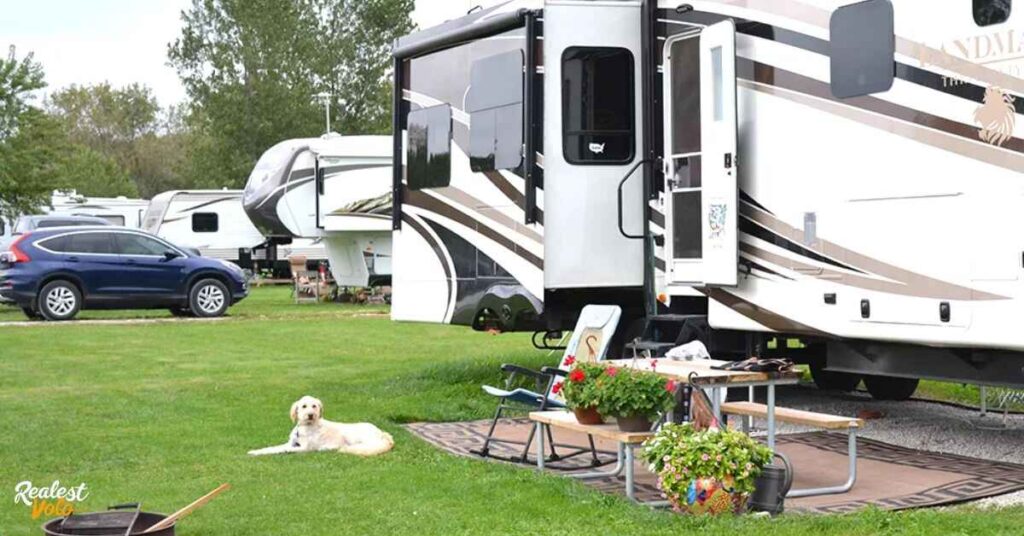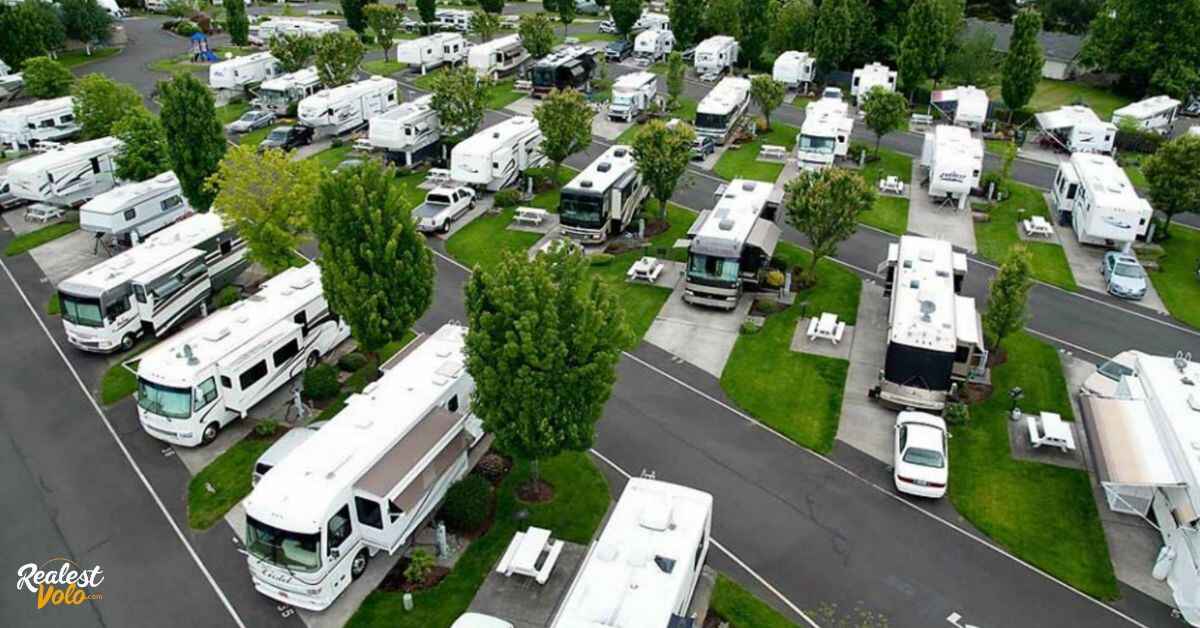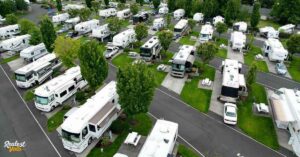RV parks are hidden gems that even the savviest of commercial real estate investors can overlook. Starting an RV park can be a lucrative business venture, catering to the growing demand for recreational travel and outdoor experiences. However, it’s a complex undertaking that requires careful planning, financing, and execution.
In this comprehensive guide, we’ll dive into the intricacies of starting an RV park, covering everything from site selection and zoning regulations to development costs and expert tips for success.
The Difference Between RV and Mobile Home Parks
Before we delve into the specifics of starting an RV park, it’s crucial to understand the distinction between RV parks and mobile home parks. RV parks, also known as campgrounds or resorts, are designed to provide temporary accommodations for recreational vehicles (RVs) and cater to travelers seeking adventure and exploration.
These parks offer amenities and facilities tailored to the needs of RV enthusiasts, such as hookups for water, electricity, and sewage, as well as recreational areas and other conveniences.
On the other hand, mobile home parks are intended for long-term or permanent residential use, with mobile homes or manufactured homes installed on individual lots. These parks typically offer more comprehensive utilities, shared community spaces, and a more residential environment tailored to those seeking a permanent living situation.
How to Start an RV Park
Starting an RV park involves a multitude of steps and considerations, each as important as the next.
Here’s a comprehensive guide to help you navigate the process:
1. Research
The first step in starting an RV park is to conduct thorough research. Analyze the local market and competition, identify potential locations, and assess the demand for RV accommodations in the area. Consider factors such as proximity to popular attractions, outdoor recreation opportunities, and accessibility to major highways or transportation hubs.
2. Business Plan

Develop a comprehensive business plan that outlines your vision, objectives, target market, financial projections, and strategies for success. A well-crafted business plan will not only guide your decision-making but also serve as a valuable tool when seeking financing or attracting investors.
3. Acquire Land, Permits, and Insurance
Secure a suitable plot of land for your RV park, taking into account zoning regulations, accessibility, and proximity to utilities. Obtain all necessary permits, licenses, and approvals from local authorities. Additionally, invest in appropriate insurance policies to protect your business from potential liabilities.
4. Develop Land
Park development costs can be significant, including site planning, infrastructure installation, amenities, and facilities. Collaborate with experienced professionals, such as civil engineers, landscape architects, and contractors, to ensure your RV park meets all safety and accessibility standards.
5. Hire Personnel
With your RV park’s physical infrastructure in place, it’s time to assemble a team of qualified and customer-service-oriented staff to manage the day-to-day operations. This may include positions such as park managers, maintenance workers, groundskeepers, and front desk staff.
Investing in knowledgeable and friendly personnel can greatly enhance the guest experience and contribute to the overall success of your RV park. Consider offering competitive compensation and benefits packages to attract and retain top talent.
6. Market Your Business
No matter how exceptional your RV park may be, it won’t achieve success without effective marketing and promotion. Develop a comprehensive marketing strategy that leverages various channels to reach potential guests.
Utilize online platforms, such as a professional website with an online booking platform, social media, and targeted digital advertising campaigns. Consider partnering with travel agencies, tourism boards, or RV clubs to increase your reach and visibility within the RV community.
Also Read: Why I Left Compass Real Estate?
The 5 Parts of Creating Your RV Park Business Plan
A well-crafted business plan is essential for the success of your RV park venture.
Here are the five key components to include:
1. Financial Projections
Conduct a thorough analysis of start-up costs, operating expenses, and potential revenue streams. Develop realistic financial projections, including break-even analysis and cash flow forecasts, to ensure the long-term viability of your business.
Start-up costs may include land acquisition, zoning and permitting fees, environmental testing costs, legal and professional fees, as well as marketing and advertising expenses. Operating expenses can encompass staff salaries, utilities, maintenance, insurance, and other recurring costs.
Revenue streams may include nightly or monthly rental fees, as well as potential income from additional services or amenities, such as laundry facilities, convenience stores, or recreational equipment rentals.
2. Competitive Analysis

Evaluate the existing competition in the area, including their offerings, pricing strategies, and unique selling points. Identify opportunities to differentiate your RV park and gain a competitive advantage. This could involve offering unique amenities, providing exceptional customer service, or leveraging your location’s proximity to popular attractions or outdoor recreation areas.
3. RV Industry Statistics
Incorporate relevant industry statistics and trends to support your business case and demonstrate your understanding of the RV market. This includes data on RV ownership, travel patterns, and consumer preferences. By staying informed about the latest industry trends and consumer behaviors, you can tailor your offerings and services to meet the evolving needs of RV travelers.
4. Tenant Leasing Agreements
Outline your policies and procedures for tenant leasing agreements, including rental rates, term lengths, and any additional fees or services offered. Clearly define the terms and conditions, as well as any rules or regulations that guests must adhere to during their stay at your RV park.
5. Amenities
Determine the types of amenities and services you plan to offer at your RV park, such as swimming pools, laundry facilities, recreational areas, or on-site convenience stores. Outline the specific features and benefits of each amenity, as well as any associated costs or fees. These amenities can be a significant differentiator and contribute to the overall guest experience, potentially justifying higher rental rates.
How Much Does It Cost to Start an RV Park?
The cost of starting an RV park can vary significantly depending on various factors, including location, size, and the level of amenities and infrastructure required.
Here’s a breakdown of some common costs:
RV Park Startup Costs
- Land acquisition
- Zoning and permitting fees
- Environmental testing costs
- Legal and professional fees
- Marketing and advertising expenses
RV Park Development Costs
- Site preparation (grading, clearing, etc.)
- Utility installation (water, electricity, sewage)
- Septic system or wastewater treatment
- Road construction and paving
- Landscaping and fencing
- Building construction (office, restrooms, etc.)
- Amenities (pool, playground, recreation areas)
Cost of Building RV Sites

- Grading and leveling
- Paving or gravel installation
- Utility hookups (water, electricity, sewer)
- Site landscaping and amenities
RV Park Septic System Cost
The cost of installing a septic system or wastewater treatment facility can be a significant expense, ranging from tens of thousands to hundreds of thousands of dollars, depending on the size and complexity of the system required. Factors such as the number of RV sites, local regulations, and soil conditions can all impact the overall cost.
Environmental Costs
Depending on the location and regulations, you may need to conduct environmental assessments, surveys, or inspections to ensure compliance with local and federal laws. These costs can vary widely based on the scope of work required, but they are essential to avoid potential fines or legal issues down the line.
Maintenance Costs
Ongoing maintenance costs, such as landscaping, repairs, and upkeep, should also be factored into your budget. These expenses can add up quickly, especially for larger RV parks, and can include costs for repaving or resurfacing roads, maintaining amenities like pools or playgrounds, and general grounds upkeep.
Also Read: What Is a BOV In Real Estate?
RV Park Income and Expenses: Are RV Parks Profitable?
The profitability of an RV park depends on various factors, including occupancy rates, rental fees, and effective cost management. While the initial investment can be substantial, a well-run RV park can generate significant revenue and return on investment (ROI).
Here are some strategies to maximize profitability:
Minimizing Payroll Costs
One of the largest ongoing expenses for an RV park is payroll. Streamline your staffing and workforce by automating certain processes or outsourcing tasks when possible. Cross-train employees to handle multiple responsibilities and optimize scheduling to reduce overtime expenses. Additionally, consider implementing self-service options, such as online check-in or automated payment systems, to reduce the need for dedicated front desk staff.
Minimizing Maintenance Costs

Implement preventive maintenance programs to extend the lifespan of your equipment and facilities. Regularly inspect and service systems like plumbing, electrical, and HVAC to catch issues early and avoid costly repairs. Consider energy-efficient upgrades and sustainable practices to reduce long-term maintenance costs.
Minimizing Utility Costs
Utility expenses, such as electricity, water, and gas, can quickly add up, especially in larger RV parks. Invest in energy-efficient appliances, water-saving fixtures, and renewable energy sources (e.g., solar panels) to lower your utility costs over time. Additionally, encourage guests to conserve resources by providing educational materials and incentives for eco-friendly practices.
RV Park Zoning Regulations
Zoning regulations play a crucial role in starting an RV park. These regulations vary by locality and can dictate factors such as the permitted location, density, noise levels, and types of amenities allowed. It’s essential to research and comply with all local zoning ordinances, codes, and bylaws to avoid potential legal issues or fines.
Depending on the area, you may need to obtain specific permits or approvals for activities like outdoor events, live music, or the sale of certain goods or services. Additionally, some areas may have restrictions on the types of structures or buildings you can construct, as well as requirements for setbacks, landscaping, and parking.
8 Expert Tips for Starting an RV Park
Starting an RV park is a complex undertaking, but following these expert tips can increase your chances of success:
1. Get Expert Financing
Securing adequate financing is crucial for any new business venture, and RV parks are no exception. Seek professional guidance and explore financing options such as loans, investments, or capital from experienced lenders or investors who understand the RV park industry. Having a solid business plan and financial projections will be essential when approaching potential lenders or investors.
2. Register Your Business with Google
In today’s digital age, having a strong online presence is essential for attracting and retaining customers. Ensure your RV park is visible to potential guests by registering your business with Google and optimizing your online presence through local listings and search engine optimization (SEO) strategies.
3. Have a Professional Website with an Online Booking Platform
Invest in a user-friendly, responsive website that showcases your RV park’s amenities and offerings. Include high-quality photographs and virtual tours to give potential guests a glimpse of what your park has to offer. Additionally, incorporate an online booking platform to streamline reservations and enhance the customer experience.
4. Provide WiFi
In today’s connected world, offering reliable and high-speed WiFi is essential for attracting and retaining guests. Consider investing in a robust WiFi infrastructure to meet the demands of tech-savvy travelers who require constant internet access for work, entertainment, or staying connected with loved ones.
5. Get Good Insurance

Protect your business from potential liabilities by obtaining comprehensive insurance coverage, including property insurance, liability insurance, and any additional policies specific to the RV park industry. Work with reputable insurance providers who understand the unique risks and challenges associated with operating an RV park.
6. Practice Sustainability
Implement sustainable practices, such as water conservation, energy efficiency, and waste reduction, to reduce your environmental impact and appeal to eco-conscious travelers. Consider incorporating features like solar panels, rainwater harvesting systems, and recycling programs into your park’s design and operations.
7. Provide Low-Cost Extras
Offer low-cost extras or add-on services, such as firewood, propane refills, or snack bar items, to generate additional revenue streams and enhance the overall guest experience. These small touches can make a big difference in guest satisfaction and encourage repeat visits.
8. Stock Traveling Essentials
Consider setting up a small convenience store or vending area stocked with essential travel items, such as toiletries, snacks, and camping supplies, for the convenience of your guests. This not only provides an additional revenue stream but also adds value to your guests’ experience by ensuring they have access to necessary items without having to leave the park.
The ROI of RV Parks
The return on investment (ROI) for an RV park can be substantial, especially if the park is well-managed and located in a desirable area. According to industry reports, well-run RV parks can achieve a return on investment (ROI) ranging from 10% to 25% or higher.
It’s important to note that the ROI can vary significantly depending on factors such as location, occupancy rates, operating expenses, and the overall demand for RV accommodations in the area.
To maximize your ROI, it’s crucial to develop a comprehensive business plan, carefully manage costs, and implement effective marketing strategies to attract a steady stream of guests. Additionally, offering desirable amenities, maintaining excellent customer service, and continuously improving and upgrading your facilities can help increase occupancy rates and command premium rental rates.
Frequently Asked Question
What Are The Key Steps To Starting An RV Park?
Research the industry, create a detailed business plan, acquire land and permits, develop the site, hire staff, and market your park.
How Do I Finance An RV Park?
Financing can be obtained through traditional bank loans, private equity, or specialized debt brokerages that cater to large-scale investments.
What Should Be Included In The Site Plan For An RV Park?
The site plan should include layout details for RV pads, utility hookups (electricity, water, septic), amenities, roads, landscaping, and recreational areas.
What Permits Are Needed To Start An RV Park?
You will need zoning permits specific to your area, environmental permits, and health department approvals for water and septic systems.
How Can I Make My RV Park Attractive To Guests?
Offer a variety of amenities such as WiFi, full hookups, recreational facilities, and a well-stocked onsite market, and ensure excellent customer service and cleanliness.
Final Words
Starting an RV park can be a rewarding and profitable venture for those willing to navigate the complexities of site planning, zoning regulations, and business operations. By conducting thorough research, developing a robust business plan, securing adequate financing, and following expert tips, you can increase your chances of success in this competitive industry.
Remember, the key to a thriving RV park is providing an exceptional guest experience, offering desirable amenities, and continuously adapting to the evolving needs and preferences of RV travelers. With dedication, strategic planning, and a passion for the outdoors, you can turn your RV park dream into a reality.
As you embark on this journey, surround yourself with knowledgeable professionals, from legal advisors and financial experts to experienced contractors and marketing specialists. Their guidance and expertise can help you navigate the intricate challenges and avoid costly mistakes.











